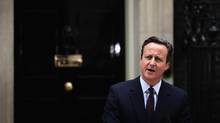Can Britain survive its Bloc Écossais?
The latter is what some commentators in Quebec have taken to calling the horde of Scottish National Party MPs elected in last week’s British vote. Like their erstwhile Bloc Québécois counterparts, those 56 SNP MPs will now take their seats in the national parliament of the country they want to dissolve. But unlike the Quebec version, the Scottish Bloc has time on its side.
The results of Thursday’s British vote carried parallels with Canada’s 1993 federal election, when the BQ swept 54 seats in its home province and became the Official Opposition in the House of Commons. That vote presaged the 1994 provincial election that returned the Parti Québécois to power and set the stage for a second referendum on Quebec independence.
The SNP now has to decide whether to promise another vote on Scottish separation as it campaigns to retain its hold on the Scottish Parliament in an election next year. The Yes side lost last September’s referendum, but the SNP emerged from that vote stronger. With 56 of Scotland’s 59 seats in the House of Commons, up from only six before Thursday’s election, the SNP now speaks as the voice of Scotland at Westminster.
The coming months will determine whether the SNP’s strong representation in the national Parliament buttresses the case for another referendum or renders a second independence vote redundant. On Friday, freshly re-elected British Prime Minister David Cameron promised to move “as fast as I can” to devolve more power to Scotland. But will it be too little, too late? Will frustration at Westminster whet Scots’ appetite for even more power?
Mr. Cameron’s Conservatives owe their surprise victory in large part to the prospect of a Labour-SNP coalition government. Voters outside Scotland could not bear the thought of the Scottish separatists holding the balance of power in Parliament. A Tory majority government is anathema to most Scots, however, and provides a perfect foil for the left-of-centre SNP as it remakes the case for separation.
Mr. Cameron promised to govern as “a party of one nation, one [United Kingdom]” to ensure that the economic recovery stretches north. But he faces a couple of major complications of his own making as he prepares once again to take on the Scottish secessionists.
One is that he has promised that only MPs from constituencies in England would be allowed to vote on matters affecting England alone. Appealing – pandering, if you like – to English nationalists was part of Mr. Cameron’s attempt to win back votes from the far-right UK Independence Party. UKIP’s popular vote surged to nearly 13 per cent, but it won only a single seat in Parliament, thanks to Britain’s first-past-the-post electoral system. But despite losing its colourful leader Nigel Farage, UKIP remains a force that Mr. Cameron will feel compelled to counter with, well, more pandering. That can only be good news for the SNP.
Another challenge Mr. Cameron faces is that he must make the case against Scottish separation while preparing his own referendum on Britain’s membership in the European Union. That additional pander to the UKIP crowd could come back to bite him. Mr. Cameron no more wants Britain to leave the EU than he wants Scotland to leave the United Kingdom. Pure politics is behind his vow to renegotiate Britain’s membership in Europe and hold an up-or-down vote on it in 2017. Should Britain quit the EU, independence will look more attractive to many Scots for whom economic links to Europe via Britain are the main reason for voting No.
If Mr. Cameron is lucky, enough Scots will be satisfied with a measure of devolution and a distinct voice at Westminster to bide their time. Unlike their Quebec counterparts, Scottish separatists have time to spare. Their movement is propelled by a young and ethnically diverse generation of Scots; Quebec’s depends on a dying generation of Quiet Revolutionaries.
The beleaguered BQ will cheer the SNP’s fortunes and attempt to appropriate a bit of its magic. But time is short. As the presumptive PQ leader Pierre Karl Péladeau reminded party members in March, “We don’t have 25 years ahead of us.” Demography may be destiny.
Bad news for the BQ/PQ. Good news for the Bloc Écossais.
Britain’s separatists have time on their side

























Laissez un commentaire Votre adresse courriel ne sera pas publiée.
Veuillez vous connecter afin de laisser un commentaire.
Aucun commentaire trouvé